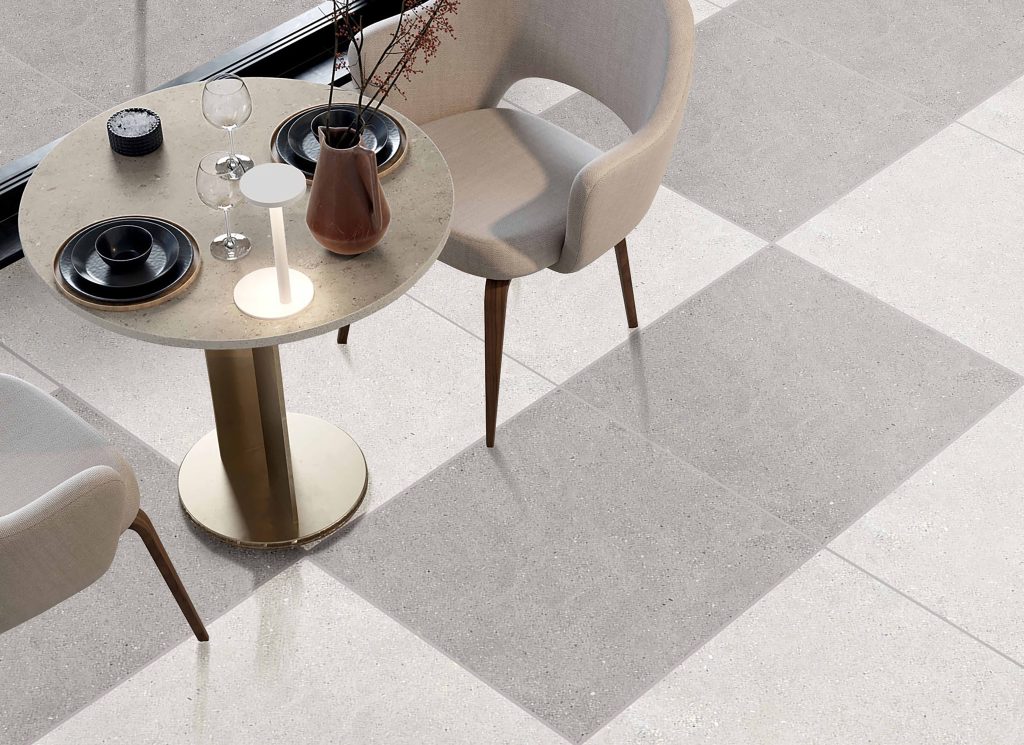Elevate your home with trendy, scratch-resistant floor tiles
More homeowners opt for waterproof and scratch-resistant flooring to keep their spaces fresh. These floors are a hit because they can handle spills and daily wear, offering a challenging yet easy-to-maintain-for option. It’s an excellent solution for busy families looking for something low-maintenance that doesn’t compromise appearance.
A wide range of flooring options resist scratches while staying stylish. From luxury vinyl and rigid laminate to durable porcelain, each material brings its benefits depending on what your home requires.

This guide breaks down six scratch-resistant flooring types, covering their key features, benefits, and what to remember when choosing. It empowers you to make the best decision for your home.
We’ve put together this simple guide with all the critical info you’ll need to help you choose trendy, scratch-resistant floor tiles for your home.
Durable Scratch-Resistant Flooring Options
Porcelain Tile
Porcelain tiles are denser & stronger than ceramic floor tiles, making them less prone to stains and scratches. That’s why it’s a smart option for commercial spaces and homes. Its strength and stylish appearance make it a perfect fit for kitchens, offering scratch-resistant tiles and waterproof protection in high-traffic areas.
Even though porcelain tiles are more durable than ceramic floor tiles, they come with an astronomical cost. However, their longevity can lead to savings in the long run. Porcelain is more rigid and denser, making it perfect for high-traffic spaces like kitchens, mudrooms, hallways, and living rooms, ensuring a reliable and worthwhile investment.
Luxury Vinyl Flooring
Luxury vinyl flooring is a go-to for waterproof and scratch-resistant tile options. It offers the look of natural hardwood while providing excellent durability against water and stains. Plus, it’s a favourite among DIY enthusiasts because it’s easy to install, often going over existing floors without needing nails or glue. Maintenance is a breeze, too—just regular sweeping and mopping will keep it looking its best. It is perfect for kitchen, porch, and bathroom floor tiles.
Laminate Flooring
If you’re working with a tight budget but still want waterproof and scratch-resistant tile flooring, laminate is a fantastic choice. It’s stylish, durable, and mimics the look of wood or stone. It is built with three high-density layers and stands up well to scratches, making it perfect for homes with kids or pets. The click-and-lock design makes installation a breeze, even for DIYers, and it can be laid over existing floors. However, for a more professional finish and to ensure the best performance of your flooring, we recommend considering professional installation. Plus, it’s easy to clean & maintain, keeping your home looking great with minimal effort.
Engineered Hardwood Flooring
Homeowners often lean toward engineered hardwood for the classic hardwood style with extra toughness.
Engineered hardwood combines the vintage appeal of wood with durability and water resistance to meet modern needs. It features a genuine wood top layer bonded to several layers of plywood, along with a waterproof core. This construction makes it more stable and less likely to crack or warp than solid hardwood.
Engineered hardwood can be easily set up as a floating floor, making it simpler to DIY than traditional hardwood. To keep it in great shape, it usually needs regular sweeping and an occasional mop with a wood-friendly cleaner.
Vitrified Tiles
Vitrified tiles are more durable and resistant to everyday wear and tear compared to other flooring options, such as marble, stone, or wooden planks. However, they can still be susceptible to scratches and marks if heavy items are moved on them. These tiles add a touch of elegance & style to your space and make your room decor stand out.
Vitrified tiles have several advantages: they don’t absorb moisture, are resistant to stains and scratches, are easy to clean, and are incredibly strong, making them perfect for bathroom and kitchen floor tiles. Additionally, you can find vitrified wall tiles in various colours and designs, allowing you to create a cohesive look with your floor tiles or choose tiles that complement your wall tiles beautifully.
Bamboo Floors
Bamboo is an excellent pick if you’re looking for an eco-friendly flooring option. It’s a renewable resource that can be harvested in three to five years, much quicker than traditional hardwood. While bamboo isn’t as challenging as engineered hardwood or other wood floors, it can still hold up for 15 to 20 years with proper care.
Few Coating Techniques to Protect Your Tiles
Common Coating
Oil finishes include options like UV Oil and Hard Wax Oil, whereas Urethane is often combined with Aluminum Oxide for added durability.
Both oil and urethane offer distinct advantages when it comes to protecting floors from scratches. Urethane with Aluminum Oxide is typically viewed as the more robust option, creating a thick barrier against scuffs. On the other hand, oil finishes maintain a more “raw” appearance since they don’t seal the surface, which can help mask scratches effectively.
Sealant Application
Using a sealant, such as a penetrating tile sealer, creates an invisible protective barrier on your tiles. This sealant fills in tiny pores and imperfections in the tile surface, making it harder for scratches to develop.
Conclusion
With sustainability gaining importance in home design, many tile manufacturers create scratch-resistant tiles from eco-friendly materials and processes. These tiles help the environment and deliver the same durability and aesthetic charm as traditional options. In addition to the previously mentioned types, other trendy scratch-resistant tile choices include cork, ceramic floor tiles, and stone tiles. Opting for scratch-resistant flooring benefits your home and the environment, as many of these options are made from sustainable objects & can be recycled towards the end of their lifespan.
Several parameters influence scratch resistance, such as the hardness of the tile and its finish; generally, the more complex the tile, the more resistant it will be to scratches. Tiles with a polished or honed finish are more likely to show scratches than those with a textured finish, such as matte or wood-look tiles. The slight texture can help disguise minor scratches and flaws. Additionally, the way tiles are installed can affect their scratch resistance; uneven or poorly spaced tiles can allow dirt & debris to accumulate in the grout lines, making scratches more noticeable. Applying a suitable tile sealer to the grout can also help prevent staining.
